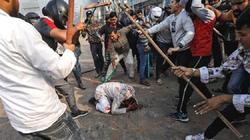 A number of Iranian intellectuals and academicians, in a letter to UN High Commissioner for Human Rights Michelle Bachelet, urged him to take urgent action to put an end to uncontrolled violence against Muslims in India.
A number of Iranian intellectuals and academicians, in a letter to UN High Commissioner for Human Rights Michelle Bachelet, urged him to take urgent action to put an end to uncontrolled violence against Muslims in India. RNA - “It is hoped that the High Commissioner for Human Rights will carry out its legal duties in accordance with the principle of impartiality and, by presenting a factual report, will draw the attention of the Secretary-General and relevant UN bodies to this important issue and take immediate and urgent action to rescue the oppressed Muslims in India,” a group of Iranian elites, analysts and academic academicians wrote in a letter on Wednesday.
Last month, in the worst communal violence in decades in New Delhi, nearly 50 people were killed and over 100 wounded as groups chanting Hindu nationalist slogans torched mosques and dozens of Muslim houses.
Last month’s worst anti-Muslim violence by Hindu nationalists began on the eve of a state visit by US President Donald Trump, infamous for his anti-Muslim rhetoric and policies.
Anti-Muslim violence started in India amid widespread protests over the Citizenship (Amendment) Act (CAA) that Prime Minister Narendra Modi’s Hindu nationalist government introduced in December, offering a path to Indian citizenship for six religious groups from neighboring countries, specifically excluding Muslims.
Critics insist the law is discriminatory, coming in the wake of other severe government measures against the country’s Muslim population such as withdrawal of autonomy for Muslim-majority Jammu and Kashmir province that has intensified discord across India about the future of its 200 million Muslims.
Last Monday, Iranian Foreign Minister Mohammad Javad Zarif condemned the outburst of violence against Indian Muslims, urging New Delhi to protect all of its citizens regardless of their faith and ethnicity.
“Iran condemns the wave of organized violence against Indian Muslims,” Zarif said in a tweet, while highlighting amicable relations between Tehran and New Delhi
“For centuries, Iran has been a friend of India,” he said, adding, “We urge Indian authorities to ensure the wellbeing of ALL Indians & not let senseless thuggery prevail.”
“Path forward lies in peaceful dialogue and rule of law,” Zarif concluded.
Before Zarif, Iranian Foreign Ministry Spokesman Seyed Abbas Mousavi voiced his country’s serious concern about the rising atrocities against Muslims in India, adding that Tehran is consistently following up the case.
“We are following the news coming from India with concern,” Mousavi said in his weekly presser.
“The Islamic Republic of Iran is following up on the issue through many channels and we have heard that some Muslim countries have had some movements.”
“We know India as a country where all ethnicities and religions live peacefully side by side,” he said, adding, “We hope that violence against Muslims in India would come to an end.”
“Considering the wisdom of Indian authorities that we are aware of, the country will become a peaceful place for all ethnicities,” he said.
847/940